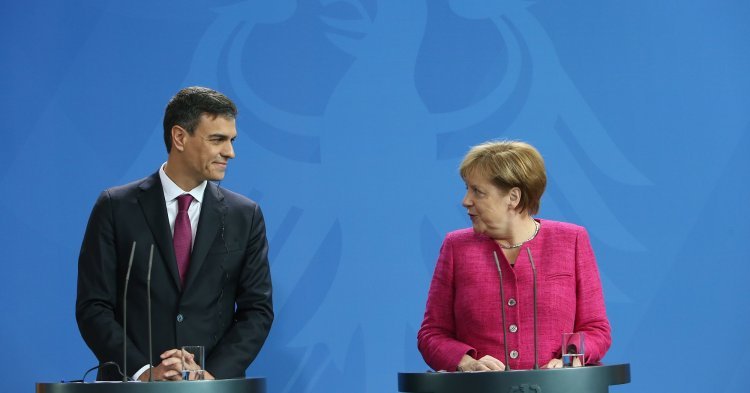As the Covid-19 pandemic sweeps the globe, leaving hundreds of thousands infected, tens of thousands of deaths and more than one billion people in confinement, European countries scramble to coordinate an effective response to the latest threat to the EU’s stability. With most of the Continent in confinement regimes, the national governments are preparing to support their economies to mitigate long-term economic damage, by preparing hundreds of billions of euros in loans, loan guarantees, and more. The European Central Bank (ECB) has also pitched in, reinstating its “whatever it takes” commitment to the euro. But the question arises... who will pay for all this?
Old ideas for new problems
Common EU debt bonds (usually dubbed “Eurobonds”) have been a central part of the debate on EU and Eurozone reform for the last years. Their popularity and notoriety grew during and after the Eurozone Debt Crisis, as their proponents saw them as way of maintaining solidarity between all member States.
By issuing common debt backed by the whole of the Eurozone or EU, those countries worst hit by the debt crisis would be able to finance themselves in the international debt markets at a lower interest rate, lifting pressure from their national budgets and speeding their recovery. However, the idea fell flat, as staunch opposition by debt-averse Northern countries faced the weak negotiating position of those in need of financial relief.
Now, Eurobonds are back in fashion, as part of a nine-country proposal (led by Italy, Spain and France) to finance the common economic recovery of the EU after the pandemic. The new “Coronabonds” would help tackle the economic problems that the pandemic is sure to cause, a “symmetric external shock, for which no country bears responsibility, but whose negative consequences are endured by all.”
Brussels’ latest row
While the new push for Eurobonds, with more widespread support, is stronger and more coordinated than the previous attempt, opposition from the Northern countries (notably the Netherlands and Germany) remains fierce. The situation came to a head at the European Council’s summit on March 27th, with Italy and Spain threatening to walk out and boycott the closing statement of the meeting over some countries’ opposition to anything they saw as meaningful action to tackle the impending economic troubles.
Germany and its supporters proposed the use of the European Stability Mechanism (ESM) and other already-available tools, which critics claim are both too limited in scope and too stringent in their conditions (not the least of which being these mechanisms technically being a bail-out, with the stigma and conditions this entails). In typical EU fashion, a compromise was reached where the parts would reconvene in fifteen days after working to develop new proposals.
Since then, the situation has further deteriorated, after comments by the Dutch Finance Minister Wopke Hoekstra, in which he questioned why the European Commission had not investigated Italy and Spain over the reason why they did not have enough funds for coronavirus emergency response, since according to him the financial crisis ended seven years ago. These comments, which echoed those made by former Dutch Finance Minister Jeroen Dijsselbloem when he accused Southern countries of spending their money on “booze and women”, sparked outrage in internet forums and social media across Europe, and were slammed by Portuguese PM Antonio Costa as “repugnant” and “contrary to EU values”.
Hoekstra’s comments are not only insensitive to the plight of those affected by the coronavirus pandemic and those who will be by its ensuing economic downturn: they also shred any semblance of European solidarity and empathy from the Dutch government. More importantly, they choose to ignore the reality of the massive fiscal effort put together by the Southern countries, in terms of cutting their budgets and raising their tax revenues (with the corresponding social cost in service cuts and tax hikes).
Some supporters of Eurobonds, especially in Southern countries, have directed their anger at Hoekstra’s comments towards the EU at large. It is, of course, important to remember that the European institutions lack the power to create Eurobonds, and have long supported further fiscal solidarity. But while unfair, said criticisms do make a valid point: the European Union is based upon the solidarity of its members for one another, and it can’t exist without it. The lack of a coherent response in solidarity with those most affected by the crisis (and the dismissive comments of some government officials) can only be blamed at the member States (not the EU), but by threatening the Union’s key principles, they threaten the Union too.
The way forward
Eurobonds are a necessary step in consolidating the Eurozone and a common European budget and treasury, and would be an ideal tool in financing the response to the Covid-19 pandemic and in ensuring Europe comes out of it stronger, more resilient, and more cohesive. Common rights demand common duties, yes, but common duties demand common rights too, and thus if member States are not free to run deficits and pursue fully independent fiscal policies (duties), they should have common rights too (Eurobonds), to ensure the prosperity of all.
Criticisms lobbed at Southern countries who push for a common debt instrument, such as their supposed lack of work ethic or fiscal discipline, often lack an empirical foundation, reducing economic problems to a supposed lack of moral character, in a moralizing attitude that should not exist anymore in the modern day. Furthermore, many point out the own issues of those who accuse the South of fiscal irresponsibility, such as the Netherlands’ pseudo-tax-haven status under the “Dutch sandwich” scheme, and the questions surrounding Germany’s budget and exports surpluses.
While neither Eurobonds nor those who propose them are by any means perfect (quite on the contrary: discussions surrounding Southern countries’ economies could fill many an article!), a common European debt instrument is the best way forward if we are to save Europe’s economy when the confinement measures end. It is not enough to summon the European Stability Mechanism, or the EU’s budget (as the Commission now proposes), as they will be too little, too late, lacking in both size (limited to two and one percent of EU GDP respectively) and flexibility (due to time constraints and conditions imposed on recipient countries).
As pressures on the Dutch and German governments pile up from both abroad and home (indeed, there is plenty of opposition to the positions of their governments in both countries), it seems their position is weakening. Although it is difficult to envisage unanimity surrounding Eurobonds, there is genuine hope that a more constructive and empathetic debate will follow throughout the next few weeks.
Solidarity and compromise have long been the basis of the European project, and they are fundamental in moving forward. If we are to keep pushing for a more cohesive and integrated Europe, then we not only have to fight for Eurobonds as a necessary statement of European solidarity – but also against those like Mr. Hoekstra who insist on not showing solidarity and empathy for their fellow Europeans, and insist in displaying that in the harshest of terms.





Follow the comments: |
|
